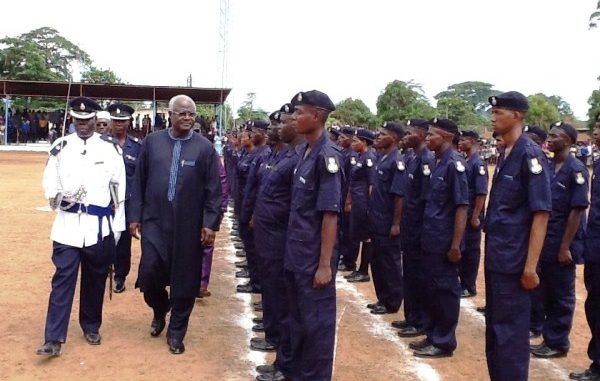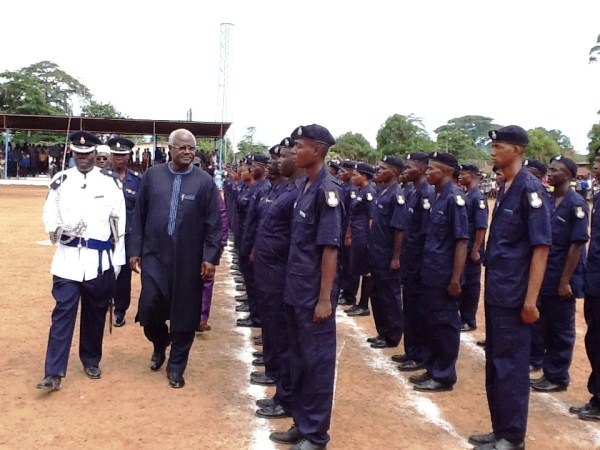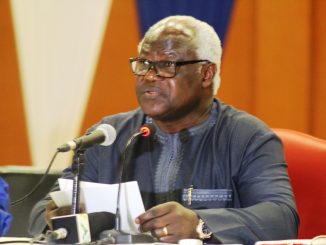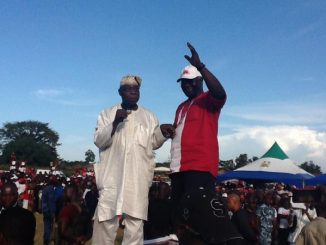
Strategic Media & Development Communications Unit
When some commentators reflect on the performance of the Sierra Leone Police Force, it is rarely accepted that such an institution would be facing constraints or that some allowance should be made for operational setbacks due to a high demand for their services and an overstretched personnel strength. The Sierra Leone Police is tasked with a statutory duty to maintain law and order and to keep the good peace of every community across the country. Such is an enormous task which largely depends on an established command and control framework, working through District, divisional and local unit command but with a centralized coordination, command and control structure.
The leadership of the force requires coordination to a high level, with management skills and capacity being primordial prerequisites for maintaining good order and high morale. The byline that the Sierra Leone Police is a force for good came after the civil war and in recognition of its complete overhaul and rebranding in the post war reconstruction. That it is a force for good is reminiscent of the good intentions behind a reformed Police force, structured to act as partners in nation building. So it is that when the Police force becomes a target for sustained reproach, there should be a rationalization of the context wherein a force for good becomes a force maligned.
The central thrust of this shift in responsiveness to the force from a force to good to a force maligned can be attributed to the rising expectations of the general public. The Police force is expected to perform and at a very high level of professionalism. Whilst this expectation of professionalism does not leave the leadership of the Police force undaunted, it embraces the herculean task of social re-engineering to change attitudes and fixed perceptions. There are two contexts upon which the pressure facing the force is based. One speaks to the baseline educational level and attainment of junior ranks, especially for those who are in the Security divisions such as the Operational Support Division (OSD). The issue of regular training and building of capacity to manage conflict is a priority within this Division and one for which ardent efforts are being made by senior management to address. It should be noted that the OSD is an armed unit and consequently the front line security apparatus for the country. The recent spate of police shootings have been a source for public outcry. Nonetheless, certain considerations need to be made when deliberating the circumstances leading to the release of gunfire by Police personnel. In the best of industrialized and Western countries, police shootings do happen, some as a matter of routine given the regularity of their occurrence. Here, the incidences of police shootings have in the main bordered on an attempt to pre-empt lawlessness breaking out into chaos. Albeit that further review have found some officers wanton in the exercise of the right to engage the public with arms, those incidences must be extricated from the management of the institution because it is clear that the preponderance of such incidences have never been policy nor a consequence of administrative directive.
There is therefore no surprise that the Police force is under pressure. With the expanding economy, the police force is tasked with providing security for the mining companies, the agricultural companies, the increasing influx of investors and plants. In essence, the force is constrained to a high degree by a lack of numbers to meet with the rising demands for its services. MDAs no longer recruit the services of private security or night watchmen but rely on the Police to provide cover.
Add to that, the tendency of this society to demand more for less, withholding praise for a force that is stretched inordinately and not recognizing that the attitudes and actions of communities may tend to result in additional pressures for the Police. The growth of urban sprawls and slums in the Western Area for example has created pseudo communities where crime and lawlessness are promulgated to a greater degree. The consequences of the internal displacement during the war years are now creating pressures for urban policing as efforts are directed to maintain law and order in sometimes areas that may be best determined to be no-go areas.
The rising expectations of the public must be tempered with a recognition of this great responsibility with which the police is faced. To a large extent, there is some understanding that this is a force that is not without its own challenges. The acceptance of the low baseline for some security officers does not detract from their obligations to maintain good order and to behave responsibly in their engagements with the general public. On another cursory note, it is accepted that public perceptions of the police are tainted with some misconceptions or misgivings. Before the war, the general perception was that of a police force rife with bribery and corruption, especially the traffic division. However, the context of a force for good made it evident that it is possible to maintain a police force free of corrupt practices. Traffic Officers were taken away from front line engagement with motorists and have been given new operational mandates to provide back up and legitimacy to the work of the Traffic Wardens in disengaging miscreant drivers and road users. In the event, although incidences or allegations of police bribery is on the downward trend, the public is still not being made aware of this positive occurrence.
Many would question the Force’s ability to adapt to changing and evolving circumstances. The emergence of e-communications for example raises new opportunities for the public to engage more fully with the Police force. New advances in mobile communications and the speed of the internet must be used to report crime, to call upon the police to engage with communities where law and order are under threat. Of course, with a well intentioned senior cadre of personnel, the Sierra Leone Police is determined to embrace new innovative ways of working. The Inspector General, Francis Munu has exuded a tacit understanding of modern methods of policing and is at the forefront of management training, passing on his skills as a qualified human resource management professional. The exigency of continuous professional development within the force is the first step to addressing capacity gap and career development imperatives. As such moves to improve on the capability and confidence of officers down the ranks are deployed across the police hierarchy, so too will the public benefit from amore resolute and determined force, commanding the respect of the public that it serves by dint of their unbounded professionalism.
That the Sierra Leone Police is a force for good is therefore not in question, except for those instances where as in many other places mistakes do occur. The Management of the force is attempting to deal with such incidences in a humane manner, seeking to addressing operational command issues within established procedures for internal discipline and morale. The force must be known to deal effectively with lawlessness even at the same time as it seeks to assure the general public of its professionalism and general commitment toward securing their safety at all times. In fact, Inspector General Munu put it rather succinctly recently when he maintained that lawlessness and good public order do not walk on the same side of the road. A thought then for the Police because theirs is the only institution of State that is mandated to traverse that side of the road where lawlessness abound whilst still within the other side where good public order, peace and security seek reassurance.
In conclusion, it is apparent that there is a need for more effective communication from the Police if any serious effort is to be engaged in educating the public about the positive achievements of the force. The Sierra Leone Police can still maintain its accolade as a force for good if public perceptions are restored to the high professionalism exhibited by the Institution. Police ranks across the entire country wear their uniform with pride and engage communities as custodians of good public order and discipline. The maligning of the Police force is but a temporary nature since the Institution is determined to undergo internal realignment and focus its strategies to secure better public order and restore law and order in our society. They have no other alternative but to sustain their position as a force for good as Sierra Leone marches towards achieving the agenda for prosperity.





Leave a Reply